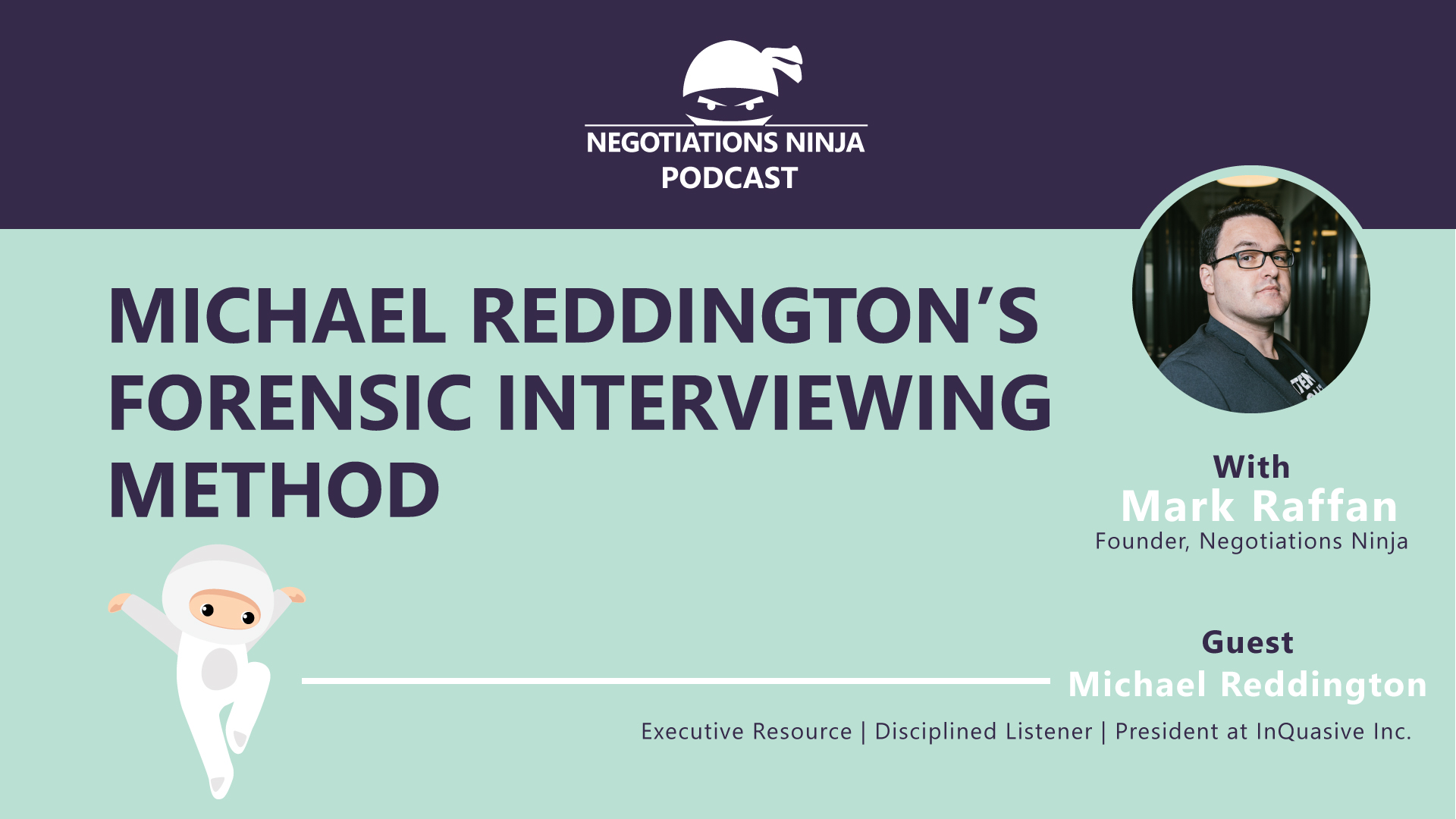What is forensic interviewing? How can it be applied to the enterprise sales and procurement process? In this episode of Negotiations Ninja, Michael Reddington—an interrogation, sales, and negotiation expert—will talk all about interrogations, listening, questioning and how they intersect with sales, negotiation, and procurement. Don’t miss it!
Outline of This Episode
- [1:32] Learn about Michael Reddington + what he does
- [3:15] The baggage that comes with the term “interrogation”
- [5:18] The end goal of an interrogation conversation
- [7:06] Where does the interview process fit?
- [10:17] What questions to ask someone being evasive
- [15:53] The tension between working the deal and pushing it
- [18:11] Do certain questions elicit a better response?
- [23:13] Tools that Michael uses as a go-to
- [24:53] Are you building trust, rapport, or both?
- [28:08] Story-telling in the forensic interview process
- [32:12] How to connect with Michael Reddington
The baggage that comes with the term “interrogation”
“Certified Forensic Interviewer” is simply a designation, like an accountant achieving a CPA. It proves the highest level of expertise and mastery in the field of interrogation.
There are times when Michael uses the term, and it spikes interest. Other times, he jokes that you’d think he just splashed them in the face with a bucket of ice water. When it comes to conversations about his career and how it applies to business, he uses analogies to help cross the bridge, so people understand the connection.
He believes the bottom line is that people perceive how you communicate with them as proof of whether or not you respect them. In any conversation, you don’t want to start by picking a fight—especially if you need to get information from someone.
If you need information and someone else has it, they’re in control of the conversation. They control when to share, how much to share, and why to share. You have to keep that in mind as you choose your approach.
The end goal of an interrogation conversation
In the investigative sense, the end goal of an interview is to get the truth, whatever it may be. It isn’t to get a confession or an admission. To get to the truth, you must inspire a sense of commitment in someone to share that truth. If you use techniques where someone says, “Okay, whatever, I’ll just tell you,” you may not get the whole truth. They may change their story as soon as they walk out of the room.
Your goal is to communicate with them in a way where they can save face and commit to sharing the truth. Whether you’re engaged in negotiations, sales, leading, coaching, or mentoring, you don’t want compliance. Compliance is temporary, is accompanied by resentment, and it’s only a short-term tactical win that could cause long-term strategic problems down the road. It’s about creating commitment over compliance.
Where does the interview process fit?
The interview process begins before the conversation starts and continues after it’s completed.
Michael starts the process with preparation. In the same way he’d prepare for an interview or interrogation, he uses the same techniques to prepare for business conversations. He focuses on the key phrases he’s always lived by, such as “illustrate before you investigate” and “questions can be perceived as invitations or attacks.”
You have to take a strategic long view and use the same persuasive elements. You use situationally aware observation, ask great questions, move people from resistance to commitment, and even follow up after. The only way to prove you listen and care is to follow up after the interaction has concluded. The approaches line up quite well between interrogations and enterprise sales.
Is the goal to build trust, rapport, or both?
In Michael’s opinion, trust is heavily reliant on rapport. The more you can build authentic rapport, the more you can increase someone’s trust level. But if you get a recommendation to work with someone from someone you trust, you may trust that person right off the bat. If you do your research and believe someone is the best of the best, you might come in with some initial trust built as well. One can exist without the other.
However, Michael believes that the harder you try and build rapport, the more it negatively impacts trust. If someone feels like you’re “trying” too hard to be their friend, it sets off bells and whistles. They question why you’re trying so hard.
For example, Michael had a Zoom call with someone and saw a plethora of sports paraphernalia on their wall. It would be a temptation for a lot of people to see that and immediately say, “Hey, I see you’re a fan of…” As soon as you do that, people know you’re trying to build rapport. Michael emphasizes to “Slow your roll.”
This particular person was from Kansas City, which just so happens to house one of Michael’s favorite BBQ places: Arthur Bryant’s. This person asked a question that allowed Michael to illustrate a conversation he had at Arthur Bryant with someone he was training. It created something they had in common that unfolded naturally, versus dumping everything he knew about Kansas City at the beginning of the conversation. It’s far more strategic.
Many sales and procurement people don’t know how to weave stories into their conversations. You have to be interesting and compelling, so people want to interact with you. So how do you tell better stories? What kinds of questions do you ask? How do you ask them? Learn more in this fascinating episode with Michael Reddington.
Resources & People Mentioned
- Influence by Robert Cialdini: https://www.amazon.com/Influence-Psychology-Persuasion-Robert-Cialdini/dp/006124189X
- Arthur Bryant’s BBQ: https://www.arthurbryantsbbq.com/
Connect with Michael Reddington
- InQuasive: https://inquasive.com/
- Connect on LinkedIn: https://www.linkedin.com/in/michaelreddingtoncfi/
Connect With Mark
- Follow Negotiations Ninja on Twitter: @NegotiationPod
- Connect with Mark on LinkedIn
- Follow Negotiations Ninja on LinkedIn
- Connect on Instagram: @NegotiationPod
- negotiations.ninja




